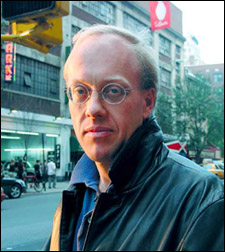The ‘intoxication’ of war:
Foreign correspondent Hedges tells of the compelling, ‘addictive’ power of combat

At a time when the United States is in the midst of war with a country that has turned out to be more powerful than expected, foreign correspondent Chris Hedges has some words about the power of war itself. The New York Times journalist recently reflected on the destructive aspects of war that he has come to identify from his own very personal experiences.
“Once the dogs of war are unleashed, we will not control them,” Hedges said March 13 during the 22nd Joe Alex Morris Jr. Memorial Lecture. The lecture is administered by the Nieman Foundation at Harvard University. Hedges was a Nieman Fellow, class of 1999.
“War has a force and power of its own. … Events we do not expect or anticipate spiral out of control. The blunt and horrible instrument of war is not like surgery. … The massive industrial slaughter of modern war pushes us closer towards our own destruction.”
He said the nation’s leaders and many Americans have lost touch with the essence of war. “Following our defeat in Vietnam, we became a better nation. We were humbled, even humiliated. We asked questions about ourselves we had not asked before. We were forced to see ourselves as others saw us,” he said.
“The sight was not always a pretty one. We were forced to confront our own capacity for atrocity, for evil. In this we understood not only war, but more about ourselves. But that humility is gone.”
Hedges is part of a generation of war correspondents who honed their craft in the conflicts following the Vietnam War. He’s reported for National Public Radio, The Christian Science Monitor, The Dallas Morning News, and since 1990, The New York Times. His recently published and widely read book, “War Is a Force That Gives Us Meaning,” discusses the dark emotions that war brings out and his own addiction to it.
Hedges started covering the insurgencies in El Salvador and then went to Guatemala, Nicaragua, and Colombia. He reported on the first Intifada in the West Bank and Gaza, the civil war in the Sudan and Yemen. Hedges covered the uprisings in Algeria and the Punjab, the fall of the Romanian dictator Nikolai Ceausescu, and then the first Gulf War. He witnessed the Kurdish rebellion in southeastern Turkey and northern Iraq, the war in Bosnia, and the battles in Kosovo.
“Drawn into the world of war, it becomes hard to escape. It perverts and destroys you. It pushes you closer and closer to your own annihilation – spiritual, emotional, and finally, physical,” he said.
Despite finding himself in increasingly more dangerous situations with each war he covered, Hedges said he could not break away.
“Each time, I came back. I accepted with a grim fatalism that I would be killed in El Salvador. I could not articulate why I accepted my own destruction and cannot now. There came to be a part of me, maybe it is a part of all of us, that decided I would rather die like this than go back to the dull routine.”
War, he said, distorts and confuses emotions and reality.
“An emotion we will all soon feel when we go to war … is comradeship. I want to warn you not to confuse this with friendship, with love,” Hedges said. “The ecstatic glow that makes us in war feel as one people, as one entity, is real. But this is part of war’s intoxication.”
He found the recent degradation of the French, for their opposition to military confrontation with Iraq, disturbing.
“The things said to insult the French are nothing short of racist. But racism is always the flip side of nationalism. It is why nationalism and the blind patriotism that comes with it, in my mind, are a disease,” he said. “So listen to those jokes about the French and tremble for our own myopia and desire for self-destruction.
Hedges said he is concerned that the nation’s leaders, as well as the American public, are not seriously considering the real impact of war. “We believe we can wage war and it can be cost-free. We believe – in the same way that doomed empires at the end of the 19th century believed – that our military technology makes us invulnerable,” he said. “At a time of soaring deficits and financial scandals and the very deterioration of our domestic fabric, war is a fine diversion.”
Through his experiences and reporting, Hedges said he is not a pacifist and does see a justification, in the most extreme cases, for the use of force. But, he added, people must understand the nature and, in his view, addictive aspects of war.
“War waged for empire or wealth in an age when those arrayed against us can also get apocalyptic weapons means we dance with our own destruction. We thrill in our own annihilation. In war, we suffer as much destruction as we wreak. When we unleash war’s awful power, we become its pawn, its tool.”
The Joe Alex Morris Jr. Memorial Lecture honors the foreign correspondent for the Los Angeles Times and Harvard graduate who was killed in February 1979 while covering the Iranian Revolution in Tehran. The lectureship was created in 1981 by family, classmates, and friends and is awarded annually by the Nieman Foundation at Harvard University.
To read the entire text of Chris Hedges’ speech go to http://nieman.harvard.edu/events/honors/morris/HEDGES-Morris.html.




